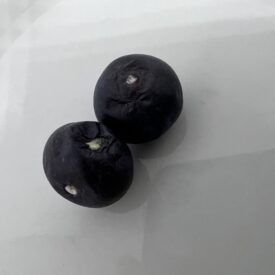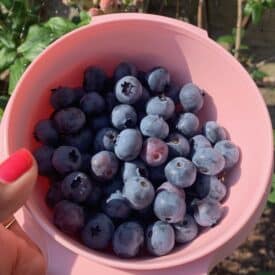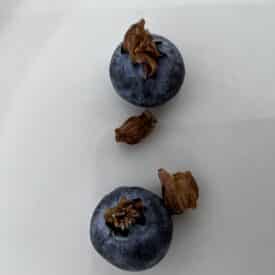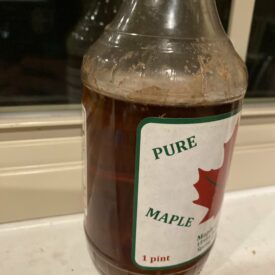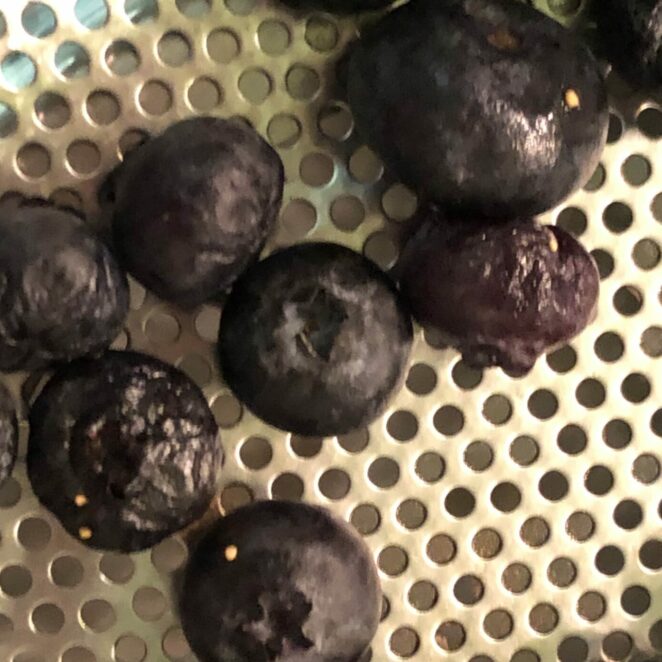
What you see: Orange dots on your blueberries.
What it is: Spore masses!
Eat or toss: Toss the spotty berries, but unaffected ones will probably be OK.
Orange dots on blueberries are probably fungus
Often, when my berries go moldy, they develop white fluffy spots, like I discussed in this post about blueberries with a mold that’s probably the Botrytis cinerea species. That mold certainly appreciates and thrives in moist conditions. But if your berries are extra wet, you may be setting them up for infection from a fungus that will leave them speckled with orange dots.
Those dots are masses of spores, most likely from a fungus called anthracnose. This fungus loooooooves moisture. That explains why in my house we usually see this fungus on berries that have been rinsed and then stored in the refrigerator for several days (more on why I have occasionally committed the sin of rinsing and then storing berries below).
You don’t want to eat a fungus-infected food because, first, ewww. Second, some fungi produce toxins that we don’t want to consume. While very dangerous molds usually don’t show up in household kitchens, it’s hard to know what you’re dealing with, and a fungal berry won’t taste great, so, just pick out the afflicted berries and eat the rest.
“I certainly wouldn’t throw the whole pint out because there were half a dozen that looked kinda crappy,” said Mark Longstroth, a retired small fruit educator at Michigan State University. He said picking out the fungal berries could help the others last longer. But anthracnose spreads quickly, so don’t delay eating the rest.
Don’t rinse berries until you’re ready to eat them
The moral of the story is don’t rinse your berries until you’re ready to use them! It’s best to put them straight into the fridge after you get back from the store. For me, these orange spore masses tend to show up after I’ve left wet berries in the fridge for a couple of days. (In my defense: I only put wet berries in the fridge when I rinse an overly ambitious amount for a meal and we don’t finish them. Next time I’m going to commit to eating those overflow berries for breakfast the next day!)
Should you rinse berries with vinegar to extend their shelf life?
Some advise rinsing berries with diluted vinegar to stave off mold. I’m not sold on this technique because then you need to dry the berries — not a simple undertaking and not one that I’m eager to do while I’m putting away my groceries and rushing off to the next thing.
I’ve also found that the amount of time blueberries last in my fridge varies greatly — from days to weeks, which probably has to do with how the blueberries were handled before I purchased them. If you believe the vinegar method is working for you, I’d urge you to test it with a control group: Divide a single package of blueberries into a group that rinse with vinegar and one that you don’t. See which one lasts longer and please report back.
I asked Longstroth if the vinegar method sounded plausible. He was dubious. More important, he said, is to make sure the berries are free from mold-enticing moisture when you put them in the fridge. “Just get all the free water you can off of them.”
SOURCES:
- Mark Longstroth. Retired Small Fruit Educator. Michigan State University Extension.
- Anthracnose (ripe rot) Colletotrichum acutatum (fungus). Michigan State University
- Michigan Blueberry Facts: Blueberry Fruit Rot Identification Guide. Phillip Wharton and Annemiek Schilder Dept. of Plant Pathology, Michigan State University. May 2003.

